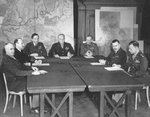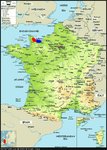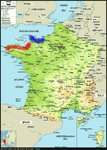Operation Neptune; The amphibious assault of Hitler's "Fortress Europe".
Operation Overlord; The conquest of Normandy, and liberation of France.
These two Operations, while many not know by name, are probably the most famous Operations in history known simply by the name "D-Day". I'm going to provide some interesting facts, and little pieces of history you may or may not have known about "D-Day".
Operation Neptune;
The beaches, from left to right, Utah and Omaha (U.S), Gold (British), Juno (Canadian), Sword (British). Beach sections from left to right Peter, Queen, Roger, Sugar, Tare, Uncle, Victor, William (Utah); Able, Baker, Charlie, Dog, Easy, Fox, George (Omaha); How, Item, Jig, King (Gold); Love, Mike, Nan (Juno); Oboe, Peter, Queen, Roger (Sword).
U.S "Western Task Force" was commanded by Rear Admiral Kirk, USN. Commonwealth "Eastern Task Force" was commanded by Rear Admiral Sir Philip Vian.
Naval Combatant Vessels: 1,213.
Landing Ships And Craft: 4,126.
Ancillary Ships And Craft: 736.
Merchant Ships: 864.
Total Vessels: 6,939.
Percentages of vessels by nation: British/Canadian: 79%
U.S: 16.5 %
Other Allies: 4.5%
133,000 Men Landed From the Sea
"I am very uneasy about the whole operation. At the best it will fall so very very far short of the expectations of the bulk of the people, namely those who know nothing of its difficulties. At the worst it may well be the most ghastly disaster of the whole war. I wish to God it were safely over." - Field Marshal Sir Alan Brooke, Chief of the Imperial General Staff, 5 June 1944.

Canadian Invasion Fleet
This is just the start. But I would like to ask, how can anyone argue that the Germans would have succeeded in 1940 when we needed all that naval power to succeed in 1944?
Operation Overlord; The conquest of Normandy, and liberation of France.
These two Operations, while many not know by name, are probably the most famous Operations in history known simply by the name "D-Day". I'm going to provide some interesting facts, and little pieces of history you may or may not have known about "D-Day".
Operation Neptune;
The beaches, from left to right, Utah and Omaha (U.S), Gold (British), Juno (Canadian), Sword (British). Beach sections from left to right Peter, Queen, Roger, Sugar, Tare, Uncle, Victor, William (Utah); Able, Baker, Charlie, Dog, Easy, Fox, George (Omaha); How, Item, Jig, King (Gold); Love, Mike, Nan (Juno); Oboe, Peter, Queen, Roger (Sword).
U.S "Western Task Force" was commanded by Rear Admiral Kirk, USN. Commonwealth "Eastern Task Force" was commanded by Rear Admiral Sir Philip Vian.
Naval Combatant Vessels: 1,213.
Landing Ships And Craft: 4,126.
Ancillary Ships And Craft: 736.
Merchant Ships: 864.
Total Vessels: 6,939.
Percentages of vessels by nation: British/Canadian: 79%
U.S: 16.5 %
Other Allies: 4.5%
133,000 Men Landed From the Sea
"I am very uneasy about the whole operation. At the best it will fall so very very far short of the expectations of the bulk of the people, namely those who know nothing of its difficulties. At the worst it may well be the most ghastly disaster of the whole war. I wish to God it were safely over." - Field Marshal Sir Alan Brooke, Chief of the Imperial General Staff, 5 June 1944.

Canadian Invasion Fleet
This is just the start. But I would like to ask, how can anyone argue that the Germans would have succeeded in 1940 when we needed all that naval power to succeed in 1944?



